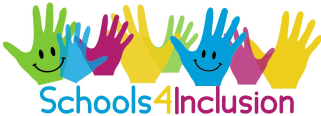Outputs
The project involves two intellectual outputs:
- Output 1: The Inclusive Schools Methodology and Guidelines
- Output 2: The Inclusive Education Online Toolkit
Our Approach: First, once an analytic primary research needs’ analysis and a desk-top study of the existing material is accomplished, the partnership will proceed with the development of the Inclusive Education Guidelines. Once the Guidelines have been developed, they will be adapted and contextualised to the specificities and the requirements of each national context.
Then, the partnership will commence the development of an Online Toolkit which is a toolbox of activities, tools and templates for schools wanting to implement the Inclusive School Methodology.
In parallel, the consortium will make an open call to the school communities of the six partner countries in order to recruit a substantial number of schools that are willing and interested to implement the Inclusive School Methodology in their unique school settings. During this time, the school governors of the schools that will be selected for testing will be trained on the inclusive education methodology in a short-term training session in Barcelona, Spain.
And finally, the partnership will test the Inclusive Education Whole School approach in a number of schools throughout Europe and will launch the Online Toolkit for testing among the school communities in Europe. The feedback and the results of the testing phase will feed into the final versions of both the Inclusive Education Guidelines and the Online Toolkit.
IO1- The Inclusive Schools Methodology
The aim of this intellectual output is the development of an analytic prescription on how the school can develop and implement a comprehensive schoolwide reform that aims to deal successfully and in an integrated manner with the promotion of the access to education and the improvement of the educational outcomes of migrant, refugee, asylum seeking students and unaccompanied minors. In other words, the Inclusive School methodology aims to provide a roadmap to any school willing to be transformed into an inclusive and democratic learning environment.
The Inclusive School methodology will be a tool at the disposal of schools and teachers who are confronted with the realities of the diverse European classrooms. The Inclusive School methodology draws attention to key issues such as human rights and equality, to the challenges stemming from cultural and ethnic diversity and to strategies for intercultural learning.
This intellectual output is comprised of the following distinct components:
a) The “Inclusive Education” Guidelines: Developed in the form of a handbook, it is expected to constitute the most effective tool for the communication of the “Schools 4 Inclusion” vision to all relevant stakeholders across partner countries.
b) The “Inclusive Education School” Action Plans: A unique tool at the hands of each school unit for the implementation of the principles of inclusive education in their own unique context.
IO2: The “Inclusive Education” Online Toolkit – The Toolbox of Activities, Tools and Templates
Teachers and schools need additional support, in the form of training and teaching materials focusing on specific areas in need of further development. The Inclusive Education Online Toolkit has the aim to fill in this gap and to provide to the willing - but unsure of how to implement inclusive practices on a day-to-day basis – educator the tools required to further inclusive education in his/her unique school environment. It is expected that the Inclusive Education Online Toolkit will constitute a go-to resource for addressing any specific need of educators irrespective of the different stage they may find themselves in providing inclusive education services to students. The Inclusive Education Online Toolkit will be developed in the form of a user-friendly digital application.
